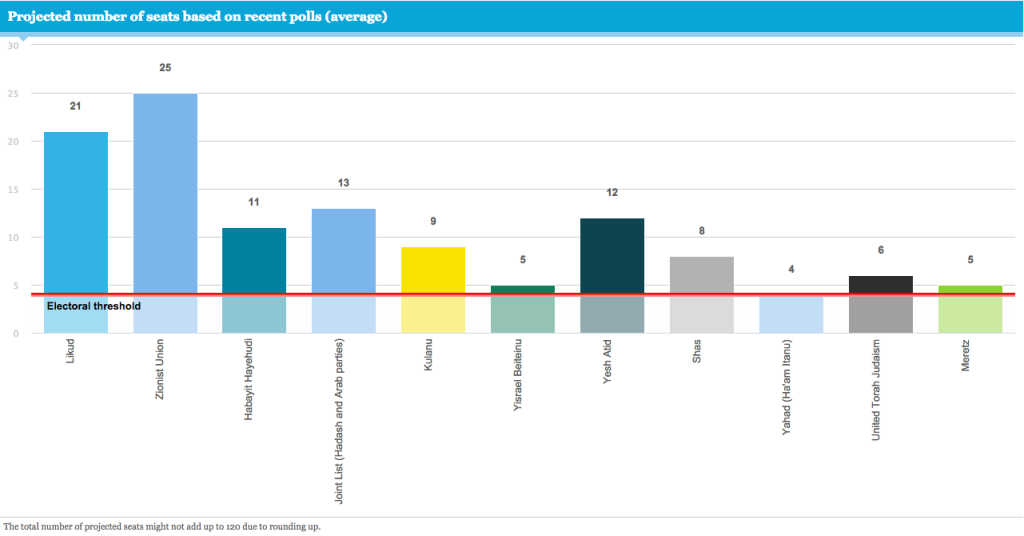

An election campaign billboard shifts between images of Israel’s Labor Party leader Isaac Herzog, left, and Likud Party leader and Israeli Prime Minister Benjamin Netanyahu in Tel Aviv on Sunday, March 15, 2015. (Oded Balilty/AP)
Final Israeli election polls show Prime Minister Benjamin Netanyahu’s Likud party projected to win 4 seats fewer than the Zionist Union, headed up by Isaac Herzog and Tzipi Livini. Israeli law forbids media outlets from publishing further polling results prior to the election and, when averaged, Herzog’s leftist Zionist Union party is projected to win 25 seats juxtaposed to 21 for Netanyahu’s Likud party.

Final average of Israeli election poll. Source: Haaretz
Polls Vs. Process
UPDATE: Internal Lukud party polls shared with PPD show for the first time a majority of Israelis do not believe Netanyahu will form the next government. On March 9, Likud’s data showed that 62.3 percent thought Netanyahu would form the coalition and 19.9 percent thought that Herzog and Livni would form the government. But on Monday, for the first time, the number believing Netanyahu would form the government fell to 49.6 percent, while 30.4 percent thought Herzog would form the coalition.
Though the polling trend shows a small but steady lead for the leftist challengers, neither Likud nor the Zionist Union will garner anywhere near the 61-seat majority of the 120-seat Parliament required to outright form a government. The real question is whether it will be Netanyahu or Herzog who will persuade enough third-party support to form a coalition that puts them at at least 61 votes.
That candidate will earn the approval of Israeli President Reuvin Rivlin, himself a Likud party member.
Netanyahu has been here before, sort of. In 2009, Livni, then the leader of the centrist Kadima party, won 28 seats to Likud’s 27. Yet, Netanyahu formed a majority coalition with his natural third-party allies. These built-in advantages again favor the prime minister, as he can tap smaller rightist and ultra-Orthodox parties for support.
The polling projections and election dynamics are similar, as Shas and United Torah Judaism have both allied with Netanyahu in the past and are likely to do so again, along with a newly-formed Orthodox splinter faction, Yahad. The polling average projects Shas to win 8 seats; the United Torah 7 seats; and, 4 seats for Yahad.
However, no record-setting prime minister serves for as long as Netanyahu without making political enemies, which will work in Herzog’s favor. Yesh Atid, a so-called centrist party that became the second largest faction in the Knesset following the 2013 elections, has gained some momentum back after an early tanking in the polls. It is far easier to see them align with the Zionist Union considering the party leader. Yair Lapid was fired from the post of finance minister in Netanyahu’s outgoing government.
Yesh Atid could add some 13 seats to a Herzog-led governing coalition that will also consist of members of Meretz, a small leftist party. The party’s potential voter base has opted instead for the Zionist Union, and Meretz leadership has said it will support Herzog for prime minister.
Moshe Kahlon, also a former Likud party member, is another likely key player in the race to form a coalition. Kahlon’s new center-right party, Kulanu, is projected by the average of polls to win 9 seats. Kahlon, who is a former communications minister, gained widespread popularity among Israelis of all political stripes when he brought the principles of a free and fair market to Israel’s cellphone sector. He opened up the market to competition, which led to a bottoming out of mobile per-minute rates.
Polling shows his promises to break up more monopolies are attractive to moderate, former Likud voters who are strong on security but disappointed by Netanyahu’s economic record. Kahlon has not said whether he will endorse Netanyahu or Herzog for prime minister after the election, but his support likely will be a critical key to the forming of a majority.
The Backstory
Make no mistake, a Likud loss or even a narrow win would no doubt be a significant development in a country where the electorate has been moving steadily rightward over the past 15 years. Benjamin Netanyahu enjoyed high approval numbers over the summer for his handling of the latest Israeli-Palestinian conflict. In fact, despite the closeness of the parliamentary race, the last poll found Israelis still prefer him as prime minister over Herzog.
How did it come to this? Well, that depends who you are asking? Interestingly, an element of the truth is found in each of their statements.
Netanyahu said Sunday that, because of anti-Israeli media and a behind-the-scenes effort by “foreign powers,” there “is a real danger that a leftist government will come to power.”
This is a charge that certainly has merit.
In large part due to the help of President Obama’s political operatives, the Israeli election has turned on economic issues rather than security issues. For the first time in its history, social welfare and other economic arguments have taken the place of Iran, Hezbollah, Hamas, and whether Palestinians will make good on their threat to cut off security ties with Israel. The last polls for Israel Army Radio found that more than half of Israelis surveyed plan to vote based on social and economic issues and that fewer than 1 in 3 put security at the top of their concerns. Nine of 10 respondents said the cost of living would influence their choice.
PPD has learned that a bipartisan Senate committee has been established to investigate the Obama administration’s use of several taxpayer-funded State Department grants to support OneVoice, a U.S.-based leftist activist organization started by five Democrats. OneVoice received two taxpayer-funded grants from the U.S. State Department in the past year totaling $200,000 and, as PPD previously reported, joined forces with the group V15 – who has a reputed mission of “anyone but Bibi” – to defeat Netanyahu. V15 is run by Jeremy Bird, known for his role as Obama’s 2012 field director.
“All the media and all the NGOs are out to overthrow the right,” Naftali Bennett, economy minister and leader of the Jewish Home Party told students at Bar-Ilan University outside Tel Aviv. “I’ve never seen such a concentrated effort, with money from abroad.”
While the committee will be digging through documents, the evidence is indeed anecdotally evident from the campaign messages of the Zionist Union.
“The citizens of Israel will replace Netanyahu, not because of what is written in the newspapers,” Livni, a longtime Netanyahu rival and the former justice minister said Sunday, “but because they don’t have enough money to buy a newspaper or buy apartments for their children.”
Future Of Israeli Policy
The significance of the Arab Joint List, including the Israeli Arab parties Balad, Hadash, Ta’al, the United Arab List, and members of the Islamic Movement — cannot be understated. Previously, these smaller factions refused to join forces, but Avigdor Lieberman’s push to raise the voting threshold parties must reach to sit in the Israeli Knesset, gave energy to the politically strategic plan. Ironically, Lieberman’s own Yisrael Beiteinu party now faces the possibility of not making the four-seat threshold required to enter Parliament following a series of ethics investigations.
The average of polls show the Arab Joint List winning 13 seats, but the party’s leader, Ayman Odeh, repeatedly vowed not to sit in any government led by Netanyahu or Herzog, which means that they will sit in the opposition and, if so, will be the first Arab party to be given several intelligence briefings by Israel Defense Forces personnel. Politicians in both right-wing and centrist parties are extremely concerned about what the Arab Joint List would do with this classified information.
This possibility has also led to Egyptian officials privately expressing concerns to current coalition members. Security competition between Israel and Egypt is at an all-time high, and as long as President Abdel Fattah el-Sisi remains the head of the largest Arab nation, anything less than a Netanyahu-led government will present the potential of reversing those gains. A Herzog-led government will cave to the Obama administration on Iran, which will undoubtedly strain relations between Israel and Cairo, as well as Saudi Arabia.
Palestinian President Mahmoud Abbas injected himself into the Israeli election recently, publicly stating that a decision to cut security ties with Israel won’t be made until after the election. Given the history between Livni and Abbas (she met with the Fatah leader in London without authorization from Netanyahu), it is fair to say the issue of Israeli settlements will be back on the table in order to work out a deal on security cooperation if Herzog becomes prime minister.
Final Thoughts
Ultimately, it is important to remember that people vote, not polls. And anyone who claims to know exactly how this election will end or who will in the end be successful in forming a governing coalition, is kidding themselves and hoping to kid you.
It is possible that neither Herzog nor Netanyahu manage a majority coalition, forcing them to join forces to form a unity government. It is even possible to see them alternate two-year terms as prime minister, though it would no doubt be a less-than-ideal for either men. Netanyahu certainly isn’t willing to concede to such an arrangement if he doesn’t have to, and is focusing on rallying his base until the end.
“This is a fateful struggle,” Netanyahu said. “We can close this gap.”






